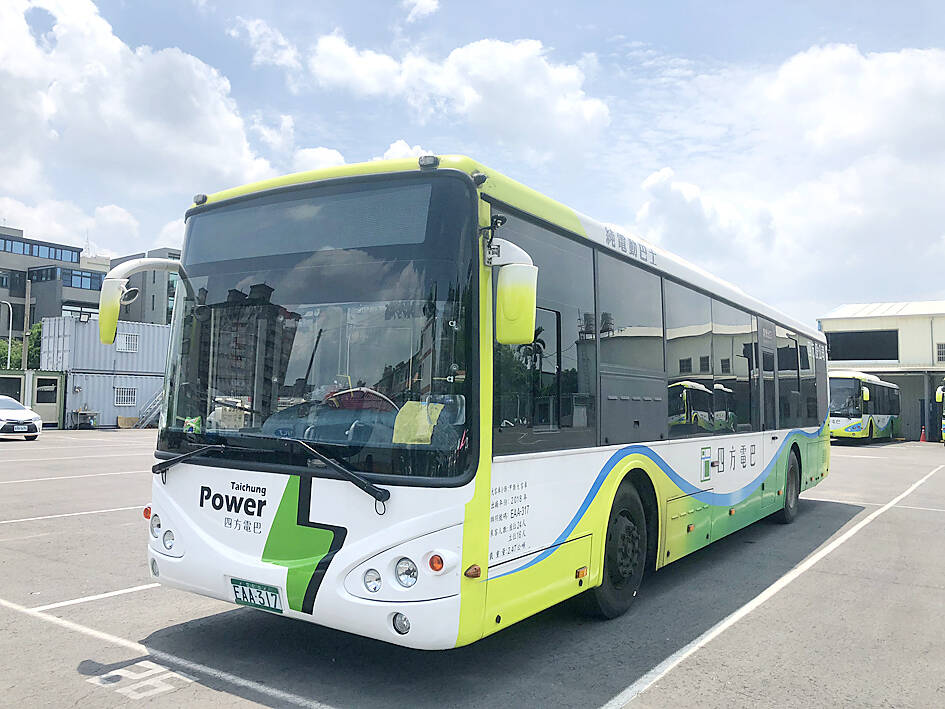About 50 drivers from Taichung-based SF E-bus (四方電巴) yesterday went on strike after the company failed to pay their salaries as scheduled for a third time, halting 470 services on 13 routes, the Taichung Transportation Bureau said.
The city government mobilized drivers from four other bus companies to fill the gap in labor, Taichung Transportation Bureau Director-General Yeh Chao-fu (葉昭甫) said, adding that it also fined the bus operator NT$2.35 million (US$72,767) and NT$90,000 for breaching its operating contract with the city government and the Highway Act (公路法).
Meanwhile, the drivers went to the city government yesterday to apply for labor dispute mediation, complaining that the latest incident is the third time this year the company had failed to pay their salaries on time.

Photo: Su Chin-feng, Taipei Times
SF E-bus first started reporting pay delays last month, a representative of the bus drivers told the Central News Agency, adding that the company failed to pay them again on Friday last week and did not provide an explanation.
While SF E-bus later guaranteed that salary payments would be made no later than Sunday after it receives a subsidy from the government, the representative said the vast majority of drivers refused to “cooperate again,” demanding that their salaries be paid immediately and the termination of their contracts with the company.
In response, the Taichung Labor Affairs Bureau said that it fined SF E-bus NT$40,000 on Wednesday last week after its employees filed complaints about the pay delay last month, adding that it plans to hold a dispute settlement meeting between the management and the drivers.
Yeh also called for the intervention of SF E-bus’ parent company, Tang Eng Iron Works Corp (唐榮), which is 11 percent owned by the central government.

With an approval rating of just two percent, Peruvian President Dina Boluarte might be the world’s most unpopular leader, according to pollsters. Protests greeted her rise to power 29 months ago, and have marked her entire term — joined by assorted scandals, investigations, controversies and a surge in gang violence. The 63-year-old is the target of a dozen probes, including for her alleged failure to declare gifts of luxury jewels and watches, a scandal inevitably dubbed “Rolexgate.” She is also under the microscope for a two-week undeclared absence for nose surgery — which she insists was medical, not cosmetic — and is

CAUTIOUS RECOVERY: While the manufacturing sector returned to growth amid the US-China trade truce, firms remain wary as uncertainty clouds the outlook, the CIER said The local manufacturing sector returned to expansion last month, as the official purchasing managers’ index (PMI) rose 2.1 points to 51.0, driven by a temporary easing in US-China trade tensions, the Chung-Hua Institution for Economic Research (CIER, 中華經濟研究院) said yesterday. The PMI gauges the health of the manufacturing industry, with readings above 50 indicating expansion and those below 50 signaling contraction. “Firms are not as pessimistic as they were in April, but they remain far from optimistic,” CIER president Lien Hsien-ming (連賢明) said at a news conference. The full impact of US tariff decisions is unlikely to become clear until later this month

GROWING CONCERN: Some senior Trump administration officials opposed the UAE expansion over fears that another TSMC project could jeopardize its US investment Taiwan Semiconductor Manufacturing Co (TSMC, 台積電) is evaluating building an advanced production facility in the United Arab Emirates (UAE) and has discussed the possibility with officials in US President Donald Trump’s administration, people familiar with the matter said, in a potentially major bet on the Middle East that would only come to fruition with Washington’s approval. The company has had multiple meetings in the past few months with US Special Envoy to the Middle East Steve Witkoff and officials from MGX, an influential investment vehicle overseen by the UAE president’s brother, the people said. The conversations are a continuation of talks that

CHIP DUTIES: TSMC said it voiced its concerns to Washington about tariffs, telling the US commerce department that it wants ‘fair treatment’ to protect its competitiveness Taiwan Semiconductor Manufacturing Co (TSMC, 台積電) yesterday reiterated robust business prospects for this year as strong artificial intelligence (AI) chip demand from Nvidia Corp and other customers would absorb the impacts of US tariffs. “The impact of tariffs would be indirect, as the custom tax is the importers’ responsibility, not the exporters,” TSMC chairman and chief executive officer C.C. Wei (魏哲家) said at the chipmaker’s annual shareholders’ meeting in Hsinchu City. TSMC’s business could be affected if people become reluctant to buy electronics due to inflated prices, Wei said. In addition, the chipmaker has voiced its concern to the US Department of Commerce